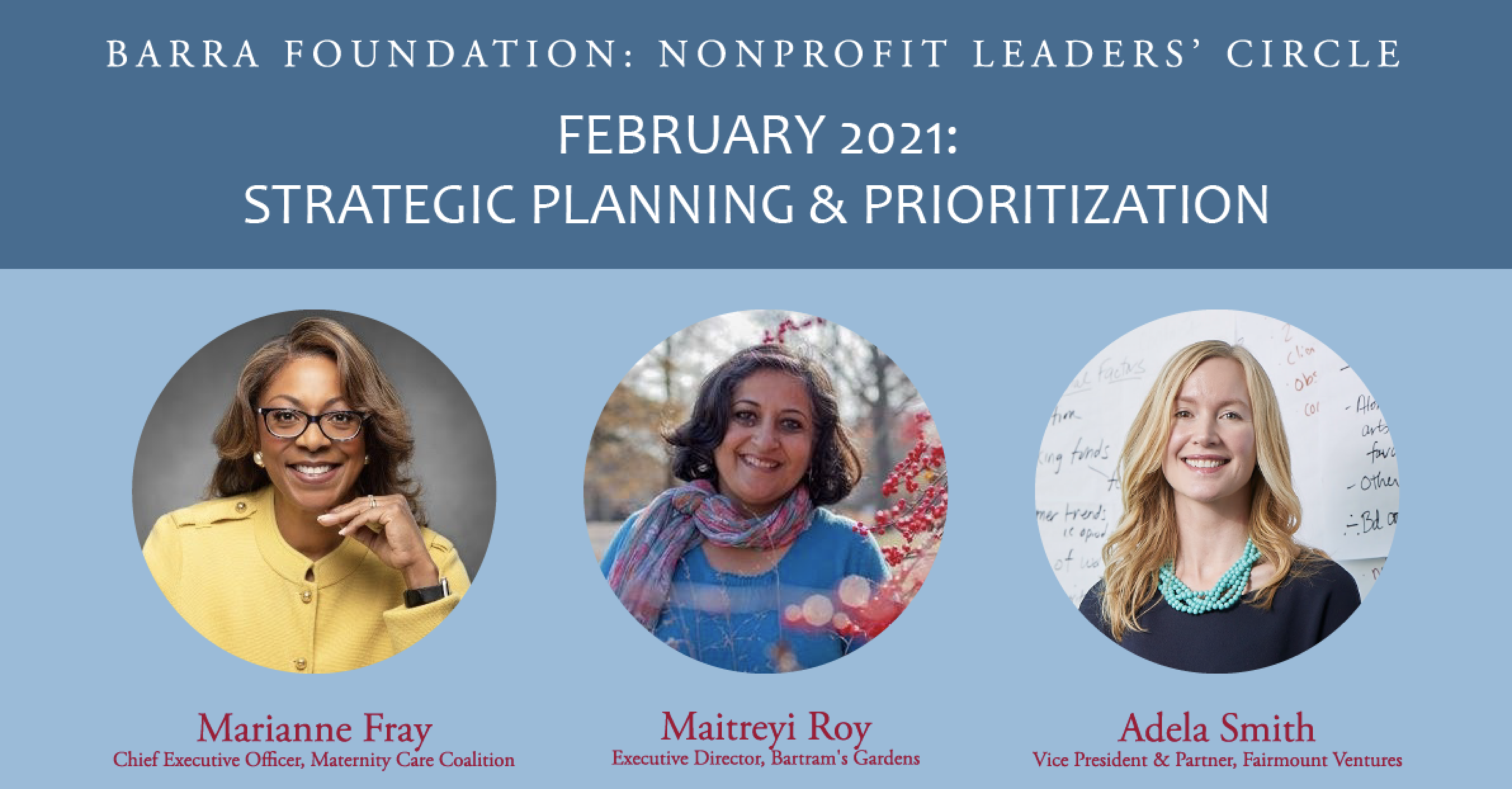
“We're struggling to find systems and move towards sustainability in this time, but every project brings so many more unknowns. We’re getting comfortable with committing to something while knowing it will change over and over again.”
Philly Nonprofit Leader
Over the last year, public and social sector leaders took courageous steps in the face of uncertainty and crisis. They responded to a growing need among the communities they serve and diminishing resources to meet that need. They rapidly pivoted their programs and learned how to deliver services virtually. One year later, they still can’t be sure how the pandemic or other unexpected events will affect their work or the communities they serve in the future.
At the first Nonprofit Leaders’ Circle Convening*, leaders reflected on the challenge of reconciling competing priorities and engaging in long-range planning given constant changes in the external environment. Guest speakers Marianne Fray, Maternity Care Coalition’s CEO, Maitreyi Roy, Bartram’s Gardens Executive Director, and Adela Smith, Vice President and Partner at Fairmount Ventures, shared insights and ideas from their experiences.
- Marianne Fray, Maternity Care Coalition’s CEO, reflected on the importance of defining your organization’s “why.” Over the last year, MCC focused on developing an intended impact statement and theory of change to guide their organization’s planning efforts. This helped ensure all stakeholders were on the same page for driving the agenda forward.
- Maitreyi Roy, Bartram’s Gardens ED, shared that who you involve in your planning efforts is as critical as the vision for change. During the pandemic, Bartram’s Gardens realized the importance of relationship building and partnerships, and collected data through surveys and conversations to deepen their understanding of community needs and goals. They used this information to celebrate diversity and remove barriers to engagement.
- Adela Smith, a Vice President and Partner at Fairmount Ventures, advised leaders to reconsider the traditional 3-5 year strategic planning process, embrace the unknown, and explore the more iterative approach of scenario planning. Scenario planning involves identifying different hypotheses of what might happen in the future and developing plans and contingencies for each of those scenarios.
The discussion surfaced 5 tips for planning and prioritization.
- Rethink the traditional strategic plan: Instead of a typical strategic planning process, use more rapid, iterative, scenario planning. Ask yourself: what are possible future scenarios and how might your organization be affected by - and plan accordingly for - each scenario?
- Focus on your why: Focus on your organization’s north star and desired impact to help guide your strategic planning efforts and prioritize decision-making. Ask yourself: who does your organization serve and what impact are you working to achieve over the long-term?
- Prioritize partnerships: Recognize your organization’s strengths and gaps and target partnerships more strategically. Ask yourself: what is your organization’s unique value and how can you partner with other organizations to realize your ultimate impact?
- Use data to understand community needs and goals: Develop processes for consistently gathering data from community members to better understand their needs and goals. Ask yourself: how can you collect data to better understand the needs and goals of the community you serve?
- Challenge traditional power dynamics: Challenge traditional notions of power by empowering a broader range of staff and community members in the planning and prioritization process. Ask yourself: how can your organization democratize decision-making and meaningfully involve diverse stakeholders in your planning processes?
Below are 5 tools that were shared during the convening as helpful resources to support planning & prioritization efforts:
- Wallace Foundation: Scenario Planning Toolkit - This scenario planning toolkit is designed to help arts organizations think through how to respond to various future conditions.
- The Bridgespan Group Toolkit - This resource includes a scenario planning toolkit for leaders to help navigate uncertainty.
- Emergent Strategy - This book offers guiding principles and strategies for planning in a constantly changing world.
- Intended Impact & Theory of Change Overview - This resource provides an overview of the process for developing an intended impact and theory of change.
- Equity & Inclusion Lens Guide - This resource provides a guide for incorporating an equity and inclusion lens into how organizations plan and deliver programs.
What is your organization’s unique value and how can you partner with other organizations to realize your ultimate impact?
*This quarterly convening was part of the Nonprofit Leaders Circle, funded by The Barra Foundation, being run by ImpactED, Connect the Dots, and Witty Gritty. Established in Fall 2020, The Nonprofit Leaders’ Circle provides over 100 leaders of Barra Foundation grantees with opportunities for continuous peer-to-peer learning and resource sharing across organizations. Our next convening will take place in August 2021.



